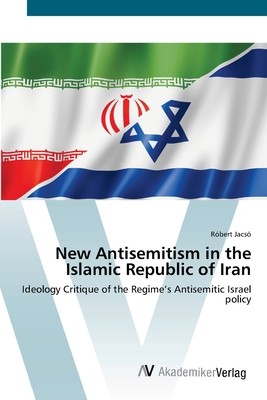
- We will send in 10–14 business days.
- Author: Róbert Jacsó
- Publisher: AV Akademikerverlag
- ISBN-10: 3639679180
- ISBN-13: 9783639679182
- Format: 15.2 x 22.9 x 0.7 cm, minkšti viršeliai
- Language: English
- SAVE -10% with code: EXTRA
Reviews
Description
This manuscript is meant to research antisemitism in the Islamic Republic of Iran. More precisely, a more modern, more specific form of anti-Semitism: "New anti-Semitism". Since Israel was established in the 'heart' of the Land of Islam in 1948, conflict on the Holy Land grew together with anti-Zionism and (new) antisemitism. Iran's antisemitic policy making process against Israel (as the collective Jew) is unprecedented since World War II. In the conceptual (theoretical) part a comprehensive analysis of antisemitism, such as new antisemitism with focus on anti-Zionism and criticism of Israel is studied, with a special respect on characteristics of Iranian antisemitic Israel policy. In this part it is necessary to locate what can be determined as 'acceptable' or 'unacceptable' criticism of Israel. With presenting examples on what counts as acceptable (non-antisemitic) critique of the Jewish state, it becomes clear, why Iranian policy-making methods cannot be acceptable. The empirical research consists of two parts: Qualitative Content Analysis and Expert Interview, which will undoubtfully serve as proof of new antisemitism existing in the Islamic Republic of Iran.
EXTRA 10 % discount with code: EXTRA
The promotion ends in 22d.08:15:01
The discount code is valid when purchasing from 10 €. Discounts do not stack.
- Author: Róbert Jacsó
- Publisher: AV Akademikerverlag
- ISBN-10: 3639679180
- ISBN-13: 9783639679182
- Format: 15.2 x 22.9 x 0.7 cm, minkšti viršeliai
- Language: English English
This manuscript is meant to research antisemitism in the Islamic Republic of Iran. More precisely, a more modern, more specific form of anti-Semitism: "New anti-Semitism". Since Israel was established in the 'heart' of the Land of Islam in 1948, conflict on the Holy Land grew together with anti-Zionism and (new) antisemitism. Iran's antisemitic policy making process against Israel (as the collective Jew) is unprecedented since World War II. In the conceptual (theoretical) part a comprehensive analysis of antisemitism, such as new antisemitism with focus on anti-Zionism and criticism of Israel is studied, with a special respect on characteristics of Iranian antisemitic Israel policy. In this part it is necessary to locate what can be determined as 'acceptable' or 'unacceptable' criticism of Israel. With presenting examples on what counts as acceptable (non-antisemitic) critique of the Jewish state, it becomes clear, why Iranian policy-making methods cannot be acceptable. The empirical research consists of two parts: Qualitative Content Analysis and Expert Interview, which will undoubtfully serve as proof of new antisemitism existing in the Islamic Republic of Iran.


Reviews